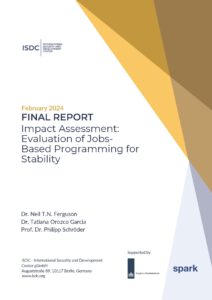Youth unemployment is one of the main challenges for economic development in fragile settings. To tackle this, SPARK has implemented “Local Employment in Africa for Development” (LEAD 2), a 4-year Dutch Ministry of Foreign Affairs-funded programme (2020/2023). The programme aims “to develop higher education and entrepreneurship to empower young, ambitious people to lead their conflict-affected societies into prosperity.” LEAD 2 focuses on job creation, aligning and connecting local labour demand and supply in Tunisia and Somalia/Somaliland, where youth unemployment is an acute challenge.
The LEAD 2 programme has three specific objectives. First, to strengthen the institutional capacity of local partner organisations and government agencies to better support small and medium-sized enterprises (SME) development, boost employment, and to reinforce a more effective business environment. Second, to create new job opportunities alongside supporting business start-ups and SMEs growth, supported with coaching and better access to finance and markets, with a focus on vulnerable and at-risk youth. Third, to enhance the skills of young people to be better prepared for the job market. These interventions are designed to contribute to the stability of the communities where the programme is implemented by promoting socioeconomic inclusion, achieved through tackling unemployment and idleness.
This report contains attributional findings from an impact assessment (IA) of the programme LEAD 2, focussing on its success in supporting new entrepreneurs. Additionally, it includes descriptive results for a component that aims to support existing SMEs. It also seeks to highlight challenges and obstacles encountered during the evaluation to allow SPARK and its implementing partners to draw lessons on the programme’s implementation and future evaluation work.
This analysis relies on baseline and endline surveys, which were collected from individuals before the start of the programme and one month after they graduated from the intervention. To estimate impacts attributable to the intervention, we employ difference-in-difference estimation to compare the outcomes of participants and non-participants from the period before implementation until the end of the intervention. We base our analysis on a sample of 480 individuals surveyed from 10 different training sessions, which took place between May 2022 and July 2023. We complement the quantitative findings with the results from endline qualitative interviews with beneficiaries and implementing partners. We estimate the attributional effect of LEAD 2 on several outcomes related to the programme’s theory of change: income, employment, business registration, justification of violence, trust, and social participation.
Results from these analyses show that LEAD 2 supported employment and business-related outcomes, particularly in business ownership and formal business registration. Notably, these effects were more pronounced among women and youth. We do not find a direct impact of the treatment on attitudes towards violence. However, among those in the program who experienced improved economic outcomes, results show improvements in attitudes relating to the use of violence as a conflict resolution. Both the economic and social findings show that the programme’s impacts are well-aligned with its theory of change.
Publication Details
- Year of Publication: 2024
- Region/s: Middle East & North Africa
- Theme/s: Capacity Building · Human Development · Impact Evaluation · Micro-Data Collection
- Research Topic/s: Employment · Peacebuilding & Reconstruction · Poverty & Inequality · Youth & Children






